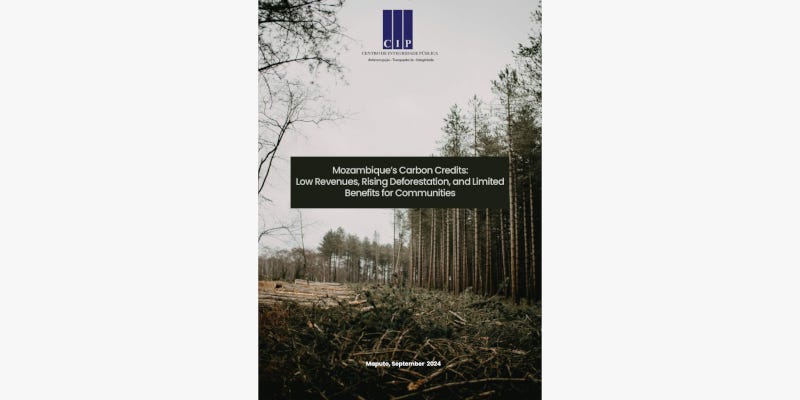World Bank-funded Zambézia Integrated Landscape Management Programme in Mozambique has failed to stop deforestation. “Minimal benefits” have reached local communities
A new report by Public Integrity Center finds that ZILMP faces “significant challenges”: increasing deforestation, slow administrative processes, and significant delays in disbursing funds.
In 2019, Mozambique launched the Zambézia Integrated Landscape Management Programme (ZILMP), part of the World Bank’s Forest Carbon Partnership Facility. The project aimed to reduce deforestation in nine districts between 2018 and 2024. The project was supposed to raise US$50 million from sales of carbon credits.
A new report by Mozambican NGO CIP (Public Integrity Center) finds that the project has reached one-quarter of its overall emissions reduction target. And only 14% of its revenue target. Minimal benefits have reached local communities. Of the ten districts with the highest forest loss in Zambézia from 2018 to 2023, six are part of ZILMP.
The report, titled, “Mozambique’s Carbon Credits: Low Revenues, Rising Deforestation, and Limited Benefits for Communities” can be downloaded here. It is also available in Portuguese, here.
Public Integrity Center notes that while Mozambique’s contributions to global greenhouse gas emissions are tiny, the country is among the ten most vulnerable to climate breakdown globally.
Monoculture plantations
Mozambique’s 2009 National Reforestation Plan includes a target to increase the area of plantations in the country to one million hectares by 2030.
In 2016, Mozambique’s published a World Bank-funded Forest Investment Plan, which included a US$2 million grant from the International Finance Corporation for “Emissions Reductions in the Forest Sector through Planted Forests”.
Mozambique’s National REDD+ Strategy focusses on expanding the area of industrial tree plantations in the country.
Behind these subsidies for plantations is Portucel Moçambique, a pulp and paper company with operations in Mozambique. The company, which is a wholly-owned subsidiary of Portuguese company The Navigator Company, has US$2.3 billion worth of plans for 200,000 hectares of eucalyptus plantations and a new pulp mill.
Justiça Ambiental has documented the impact on local communities of Portucel’s monoculture plantations in two reports dated 2016 and 2021.
And in 2017 the Environmental Paper Network described Portucel’s operations in Mozambique as “A Land Grab for Pulp”.
Zambézia Integrated Landscape Management Programme
The Zambézia Integrated Landscape Management Programme was officially launched in 2019, as part of the World Bank’s Forest Carbon Partnership Facility. The plan was to reduce deforestation in nine districts, covering a total area of 5.3 million hectares. Of this area, 49% are forested.
The World Bank’s Carbon Fund agreed to pay up to US$50 million for 10 million carbon credits from the programme.
The money was to be distributed as follows: 70% to community projects, 20% to the private sector, 4% to district authorities, 4% to the Gilé National Park, and 2% to the provincial government.
The World Bank’s first payments under the programme came in October 2021 when Mozambique became the first country to receive a payment from the Carbon Fund. The Bank paid Mozambique US$6.4 million for 1.28 million carbon credits, since 2019.
In a statement about the payment, Ivete Joaquim Maibaze, Mozambique’s Minister of Land and Environment, said,
“Forest communities are the real winners here. This agreement will allow Mozambique to secure long-term finance to provide alternatives to deforestation and reward efforts to mitigate climate change, reduce poverty, and manage natural resources sustainably to meet the Nationally Determined Contributions.”
The reality was that the payment arrived one month before the call for proposals for community initiatives was launched. When Maibaze said forest communities are “winners”, no community projects even existed.
“Minimal funds disbursed to the communities”
Public Integrity Center writes that,
The delay in distributing benefits, coupled with the slow implementation of community proposals, raises concerns about the transparency and accountability of the benefit-sharing process. With notable payments received but minimal funds disbursed to the communities, there is an increased risk of funds being diverted or misused before reaching their intended beneficiaries. Such gaps in fund distribution, especially when large sums of money are involved and governance structures are weak, could also create opportunities for corruption. Strengthening oversight and ensuring the timely distribution of benefits are essential to minimize the risk of mismanagement and to ensure that the program fulfills its intended social and environmental objectives.
By 2023, 133 community-based organisations were selected to receive payments through the programme. Public Integrity Center writes that in November 2023, US$1 million was paid to community-based organisations. But “poorly established community land delimitations, legalization processes, and a lack of financial infrastructure like community bank accounts have contributed to delays in fund transfers”.
A World Bank mission in November 2023 rated the project’s overall implementation progress as “moderately unsatisfactory” because of the delays with payments to local communities.
In December 2023, the Bank raised the overall project risk rating from “moderate” to “high”.
A World Bank 2024 implementation report states that there is a high risk of not disbursing funds in full by the Forest Carbon Partnership Fund’s closure in December 2025.
From 2020 to 2022, increases in deforestation resulted in emissions more than 3 million tonnes CO₂e above the reference period levels.
Public Integrity Center uses data from Global Forest Watch to illustrate how deforestation has increased during the Zambézia Integrated Landscape Management Programme — the high deforestation rate continued in 2023:
In total, the World Bank has only transferred about US$7 million to the government of Mozambique, because of the failure to reduce deforestation. That’s about 14% of the initial target of US$50 million.
Public Integrity Center concludes that,
ZILMP faces significant challenges, including increasing deforestation, slow administrative processes, and significant delays in disbursing funds to local communities and the private sector.






Tree plantations ARE NOT reforestation!!!!
I would venture a guess that even just the weeding of the plantations releases more soil carbon, methane and NOx then all the supposed sequestration in the plantation trees, which, being a plantation, are a CROP, not a permanent forest.